#henri attal
Text
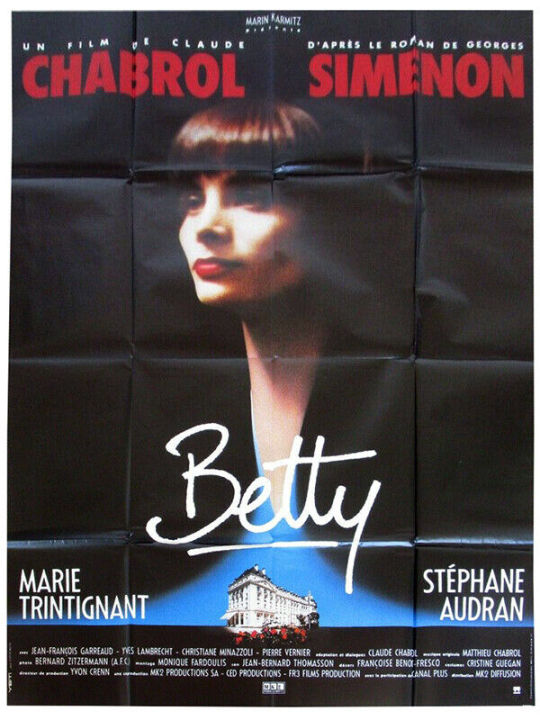
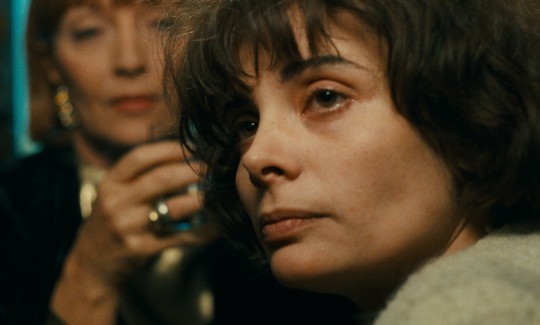
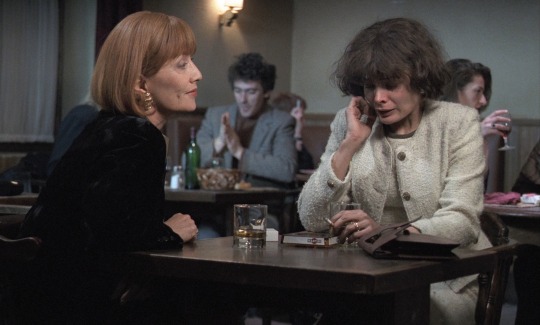


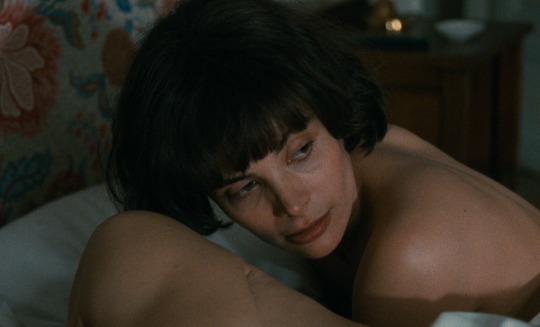

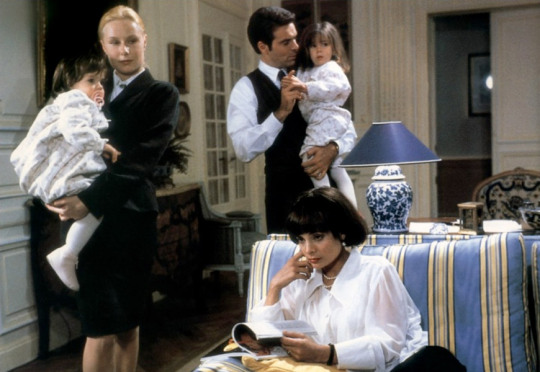
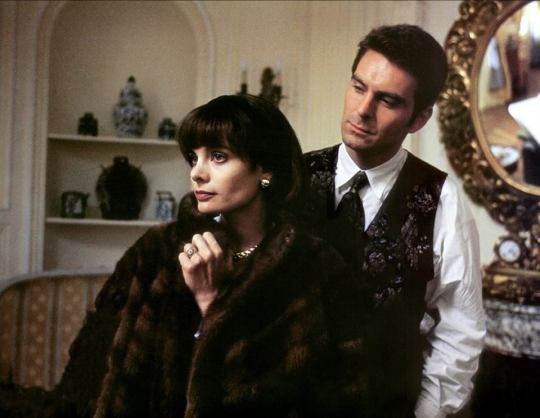

Betty (1992)
"You know, I wanted to ask Thérèse when I saw her in the cellar. I wanted to say: 'Show me your wound.' I wanted to have a wound, too. I've always been chasing that wound. I must be looking for pity. I'm not a victim. I'm not to be pitied. No one ever hurt me. I'm the one who did the hurting. I'm a fool. Say it! I blew it all. I've soiled everything, myself included."
#betty#1992#french cinema#claude chabrol#georges simenon#marie trintignant#stéphane audran#jean françois garreaud#yves lambrecht#christiane minazzoli#pierre vernier#nathalie kousnetzoff#pierre martot#thomas chabrol#yves verhoeven#henri attal#coco bakonyi#emmanuelle bataille#mélanie blatt#powerful and devastating in equal measures. a tightly focused study of one vulnerable soul in freefall. as the titular Betty#Trintignant gives a truly phenomenal performance; her character is a self destructive alcoholic who has just broken up her marriage to the#high society son of a general and signed a document promising not to contact their young children. in a drunken reverie she stumbles into#the reassuring figure of long term Chabrol collaborator (and former wife) Audran‚ who takes it upon herself to try and nurse the younger#woman back from the brink of oblivion. what follows is a quiet‚ unhurried study of a desperate psyche‚ all the more affecting for the#subdued‚ nearly vacant performance Trintignant gives: she is a woman hollowed out by her experiences and her addictions#i was surprised to read reviews with negative responses to the character (even in reviews that appreciated the film); i felt nothing but#pity for poor Betty‚ as much a victim of her vices and her psychological makeup as the people around her‚ perhaps more so#some took issue with the very ending in which she appears to 'win' and to start a new life but i think that reading ignores everything that#comes before: there can be little doubt that Betty will destroy this too‚ that we are simply witnessing the end of one cycle and the#beginning of another. challenging‚ soul searching stuff but a truly great central performance from an actor soon cruelly taken from us
5 notes
·
View notes
Text
LE MARGINAL (1983)





























Le commissaire Philippe Jordan est un flic aux méthodes expéditives. Encombrant tant pour ses supérieurs que pour ceux qu'il traque, en raison de méthodes souvent peu licites, il ne manque pas d'efficacité. Récemment muté à Marseille, il veut mettre hors d'état de nuire Sauveur Mecacci, un des parrains de la French Connection et pédophile notoire, pour qui Jordan éprouve de la rancœur. Après une poursuite en hélicoptère, duquel il saute sur un bateau, il saisit deux cents kilos d'héroïne qu'il jette à la mer. Jordan est cependant saqué à la suite de la découverte du cadavre d'un indicateur dans son salon pour le faire tomber. Jordan se retrouve alors dans un commissariat de police parisien, un « placard à balais », où il fait équipe avec l'inspecteur Rojinski, l'un de ses amis dans le commissariat.
Jordan reste toujours fixé sur son objectif, coincer Mecacci, et ne néglige aucune piste pour obtenir des témoignages contre celui-ci. Il fréquente donc les lieux les plus mal famés de la capitale, se liant au passage avec Livia Dolores Maria, une prostituée qu'il défend contre ceux qui lui reprochent de parler à un flic. Il compte aussi sur de vieilles connaissances : Francis Pierron, patron d'une salle de boxe qui s'occupe aussi de machines à sous ; « Tonton », qu'il a mis à l'ombre, mais qui accepte de le renseigner à condition qu'il arrache sa fille au squat des Antillais. Ainsi Jordan arrive-t-il à « Freddy le chimiste », ancien complice de Mecacci. Contre une somme rondelette, Freddy accepte de témoigner, mais un des sbires de Mecacci l'élimine. Jordan rattrape le tueur, Marc Villa, qui ne dit rien. Mecacci fait ensuite abattre Francis car il a refusé sa « protection ». Jordan se venge en neutralisant les tueurs lors d'une course-poursuite en voiture.
Contacté par un certain Baldi, Jordan doit arriver jusqu'au caïd, mais il déjoue un piège en neutralisant les tireurs, qui tuent Baldi au passage. Avec l'arme de ce dernier, Jordan va à la rencontre de Mecacci et le tue. Plus tard, Rojinski annonce à Jordan l'assassinat de Mecacci. Celui-ci feint la surprise, se gardant bien de lui dire que c'est lui qui a éliminé l'impitoyable criminel.
#Le Marginal#Ennio Morricone#Blizzard#The Outsider#Jean-Paul Belmondo#Maria Carlos Sotto Mayor#Henry Silva#Pierre Vernier#Maurice Barrier#Claude Brosset#Tchéky Karyo#Jacques Maury#Roger Dumas#Jean-Louis Richard#Stéphane Ferrara#Jean-Roger Milo#Henri Attal#Jean-Claude Dreyfus#Jean-Louis Airola#Jean-Hugues Lime#Philippe Héliès#René Chateau
1 note
·
View note
Text

Fantomas vs. Scotland Yard (Fantômas contre Scotland Yard), West German lobby card. 1967
#Fantomas vs. Scotland Yard#Fantômas contre Scotland Yard#André Hunebelle#Jean Marais#Mylène Demongeot#Henri Attal#Lobby Cards
1 note
·
View note
Text






The Haunting of Bly Manor (2020)
#cinematography#visual storytelling#tv stills#mike flanagan#the haunting of bly manor#horror#netflix series#netflix horror#horror tv#oliver jackson cohen#tahirah sharif#roby attal#henry thomas#amelia eve
15 notes
·
View notes
Text
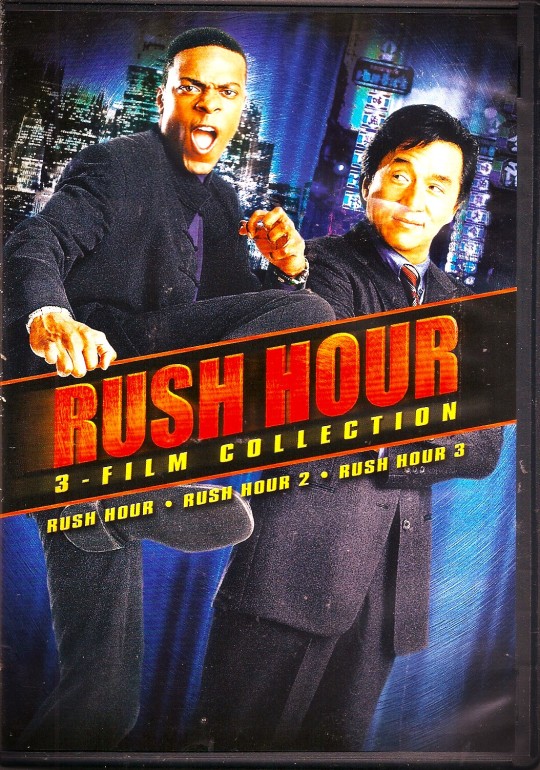
Bad movie I have Rush Hour 3-Film Collection It has Rush Hour 1998 , Rush Hour 2 (2001) , and Rush Hour 3 (2007)
#Rush Hour#Ken Leung#Jackie Chan#Tom Wilkinson#Tzi Ma#Robert Littman#Michael Chow#Julia Hsu#Chris Tucker#Chris Penn#Rush Hour 2#John Lone#Ziyi Zhang#Roselyn Sanchez#Alan King#Harris Yulin#Kenneth Tsang#Lisa LoCicero#Mei Melançon#Maggie Q#Patricia Chan#Rush Hour 3#Max von Sydow#Hiroyuki Sanada#Yvan Attal#Yûki Kudô#Noémie Lenoir#Jingchu Zhang#Dana Ivey#Henry O
2 notes
·
View notes
Text

"Maria" biopic de Jessica Palud sur une musique de Benjamin Biolay - inspiré de "Tu t'appelais Maria Schneider" biographie de Vanessa Schneider sur sa cousine l'actrice Maria Schneider (2018) autour notamment du tournage de "Le Dernier Tango à Paris" de Bernardo Bertolucci avec Marlon Brando (1972) - avec Anamaria Vartolomei, Matt Dillon, Céleste Brunnquell, Giuseppe Maggio, Marie Gillain, Yvan Attal, Jonathan Couzinié et la participation de Judith Henry, juillet 2024.
#films#Biopic#FilmsArtistes#Paris#hommage#Schneider#Bertolucci#Brando#Gelin#Palud#Biolay#Vartolomei#Dillon#Brunnquell#Maggio#Gillain#Attal#Couzinie#Henry
0 notes
Text
In the second episode of the trilogy Fantômas kidnaps distinguished scientist professor Marchand with the aim to develop a super weapon that will enable him to menace the world. Fantômas is also planning to abduct a second scientist, professor Lefebvre.
Credits: TheMovieDb.
Film Cast:
Fantômas / Fandor / Professeur Lefèvre / Marquis de Rostelli: Jean Marais
Commissaire Juve: Louis de Funès
Hélène: Mylène Demongeot
Inspecteur Bertrand: Jacques Dynam
Directeur du journal: Robert Dalban
Professeur Marchard: Albert Dagnant
Inspecteur Pierre: Christian Toma
Inspecteur Léon: Michel Duplaix
Michou: Olivier de Funès
La dame: Florence Blot
Le ministre: Robert le Béal
Président de l’assemblée: Pietro Tordi
Homme de main de Fantômas: Henri Attal
Homme de main de Fantômas: Dominique Zardi
Agent de police ferroviaire: Jacques Marin
Surveillant de l’institut: Max Montavon
Directeur de la clinique psychiatrique: Jean Michaud
Professeur suisse: Mino Doro
Homme de main de Fantômas: Yvan Chiffre
Faux huissier: Eric Vasberg
Homme de main de Fantômas: Antoine Baud
Homme de main de Fantômas: André Cagnard
Professeur canadien: Arturo Dominici
L’homme hypnotisé: Bob Morel
Un inspecteur: Antoine Marin
Un inspecteur: Bob Lerick
Homme de main de Fantômas: Pierre Palfray
Serveur du wagon-restaurant: Albert Daumergue
…: Gérard Moisan
Un inspecteur (uncredited): Philippe Castelli
Un inspecteur (uncredited): Roger Lumont
Fantômas (voix) (uncredited): Raymond Pellegrin
Film Crew:
Producer: Alain Poiré
Director of Photography: Marcel Grignon
Stunts: Jean Marais
Set Decoration: Max Douy
Makeup Artist: Anatole Paris
Director: André Hunebelle
Original Music Composer: Michel Magne
Dialogue: Jean Halain
Screenplay: Pierre Foucaud
Novel: Marcel Allain
Special Effects: Gil Delamare
Special Effects: Gérard Cogan
Assistant Art Director: Jacques Douy
Second Unit Director: Jacques Besnard
Novel: Pierre Souvestre
Assistant Director: Michel Lang
Sound: René-Christian Forget
First Assistant Director: Jean-Pierre Desagnat
Producer: Paul Cadéac
First Assistant Director: Renzo Cerrato
Production Manager: Cyril Grize
Cinematography: Raymond Lemoigne
Co-Director: Haroun Tazieff
Assistant Editor: Colette Lambert
Editor: Jean Feyte
Assistant Director: Patrick Saglio
Script Supervisor: Marie-Thérèse Cabon
Makeup Artist: René Daudin
Hairstylist: Denise Lemoigne
Set Dresser: André Labussière
Costume Design: Mireille Leydet
Special Effects: François Suné
Production Manager: Giorgio Riganti
Assistant Art Director: Jean Forestier
Unit Manager: Paule Pastier
Sound Assistant: Jean Jak
Script Supervisor: Charlotte Lefèvre
Location Manager: Gille Schneider
Production Manager: Luciano Pesciaroli
Movie Reviews:
#asylum#criminal#flying car#fugitive#gadget#hypnosis#mask#masked ball#parachute jumping#police operation#press#scientist#sequel#Top Rated Movies#volcano
0 notes
Text
Difficile ora fare un governo, ed è probabile uno scenario bloccato con gli affari correnti ancora per un po’ guidati dal premier macroniano Gabriel Attal, ieri dimissionario, quindi una situazione ideale per l’Eliseo. Ma è ancora possibile che «gli adulti» dell’Assemblea Nazionale (come li ha definiti il nuovo volto della area socialista Raphaël Glucksmann) trovino un accordo per lasciare le estreme a piedi ancora una volta e formare un governo. In ogni caso, ora il compito dei democratici, dopo aver fermato la destra estrema, è quello di fermare il populismo anche antisemita della France Insoumise di Mélenchon («a ogni costo», ha scritto Bernard-Henry Lévy), provando a separarlo dalla ragionevolezza dei socialdemocratici. Vedremo se Macron ci riuscirà.
Intanto in soli tre giorni abbiamo assistito al Grande Spettacolo della Democrazia Liberale, con la vittoria dei seri ed equilibrati laburisti di Keir Starmer in Gran Bretagna, e con il no ai fascisti in Francia (lo spettacolo è stato decisamente migliore a Londra, dove l’uscita di scena del premier conservatore Rishi Sunak è stata un capolavoro di eleganza e di fair play; a Parigi, invece, il delfino lepenista Jordan Bardella ha parlato, come un Lavrov o un Trump qualunque, di ribaltamento della volontà popolare: cher monsieur Bardella, è stata proprio la volontà popolare, espressa dai suoi connazionali con una partecipazione storica al ballottaggio di ieri, a decretare che gli elettori anche questa volta preferiscono chiunque, anche un comodino, a voi).
0 notes
Text
Mai MMXXIV
Films
Les Trois Jours du Condor (Three Days of the Condor) (1975) de Sydney Pollack avec Robert Redford, Faye Dunaway, Cliff Robertson, Max von Sydow, John Houseman, Addison Powell, Walter McGinn et Tina Chen
La Loi du silence (I Confess) (1953) d'Alfred Hitchcock avec Montgomery Clift, Anne Baxter, Karl Malden, Brian Aherne, Roger Dann, Charles Andre, O.E. Hasse et Dolly Haas
Bon Voyage (2003) de Jean-Paul Rappeneau avec Isabelle Adjani, Virginie Ledoyen, Yvan Attal, Grégori Derangère, Gérard Depardieu, Peter Coyote, Jean-Marc Stehlé et Aurore Clément
Complot de famille (Family Plot) (1976) d'Alfred Hitchcock avec Bruce Dern, William Devane, Barbara Harris, Karen Black, Ed Lauter, Cathleen Nesbitt et Katherine Helmond
Elvis: That's the Way It Is (1970) de Denis Sanders avec Elvis Presley, Richard Davis, Sammy Davis, Jr, Joe Esposito, Felton Jarvis et Red West
Reivers (The Reivers) (1969) de Mark Rydell avec Steve McQueen, Sharon Farrell, Will Geer, Rupert Crosse, Mitch Vogel, Juano Hernández, Michael Constantine, Burgess Meredith et Diane Ladd
La Belle Espionne (Sea Devils) (1953) de Raoul Walsh avec Yvonne De Carlo, Rock Hudson, Maxwell Reed, Denis O'Dea, Michael Goodliffe, Bryan Forbes, Jacques Brunius et Gérard Oury
L'assassin habite au 21 (1942) de Henri-Georges Clouzot avec Pierre Fresnay, Suzy Delair, Jean Tissier, Pierre Larquey, Noël Roquevert, Odette Talazac, Marc Natol et Louis Florencie
Une aussi longue absence (1961) de Henri Colpi avec Alida Valli, Georges Wilson, Charles Blavette, Amédée, Jacques Harden, Paul Faivre, Catherine Fonteney et Diane Lepvrier
Le Procès Goldman (2023) de Cédric Kahn avec Arieh Worthalter, Arthur Harari, Stéphan Guérin-Tillié, Nicolas Briançon, René Garaud, Aurélien Chaussade, Christian Mazucchini, Jeremy Lewin, Jerzy Radziwiłowicz et Chloé Lecerf
La Vendetta (1962) de Jean Chérasse avec Louis de Funès, Francis Blanche, Marisa Merlini, Olivier Hussenot, Jean Lefebvre, Rosy Varte, Jean Houbé et Christian Mery
Messieurs les Ronds de Cuir (1978) de et avec Daniel Ceccaldi et Claude Dauphin, Raymond Pellegrin, Evelyne Buyle, Roger Carel, Roland Armontel, Bernard Le Coq, Jean-Marc Thibault et Michel Robin
Marcello mio (2024) de Christophe Honoré avec Chiara Mastroianni, Catherine Deneuve, Nicole Garcia, Fabrice Luchini, Benjamin Biolay et Melvil Poupaud
Opération Opium (Poppies Are Also Flowers) (1966) de Terence Young avec E. G. Marshall, Trevor Howard, Angie Dickinson, Gilbert Roland, Yul Brynner, Eli Wallach, Georges Géret, Marcello Mastroianni et Anthony Quayle
Viva Maria ! (1965) de Louis Malle avec Brigitte Bardot, Jeanne Moreau, Paulette Dubost, George Hamilton, Claudio Brook, Carlos López Moctezuma et Gregor von Rezzori
Séries
Kaamelott Livre V
Le Phare
Maguy Saison 4
Retour de France - Retour à l'occase départ - Rimes et châtiment - Fugue en elle mineure - Mise aux poings - Vote voltige - St Vincent de Pierre - Courant d'hertz - Un médium et une femme - Retrouvailles, que vaille ! - Parrain artificiel - Infarctus et coutumes - Soupçons et lumières - Dakar, pas Dakar - Impair Noël - Maguy Antoinette - Otages dans le potage - Piqûres de mystique - Nécropole et Virginie - Nitro, ni trop peu - Assassin-glinglin - Le nippon des soupirs - Pas de deux en mêlée - Main basse sur Bretteville - Ski m'aime me suive - Des plaies et des brosses - Polar ménager - Une faim de look - Le bronzage de Pierre - Transport-à porte - En chantier de vous connaître - La fête défaite - Câblé en herbe - L'enjeu de la vérité - Déformation permanente - En deux tanks, trois mouvements - Postes à galère - Prince-moi, je rêve - Science friction - Démission impossible - Lis tes ratures ! - L'infâme de lettres
Affaires sensibles
Apollo 13 : Les naufragés de l’espace - La vraie arrestation du faux Xavier Dupont de Ligonnès - L'assaut sur le Capitole - Trésor de Lava : embrouilles corses - Secte, clonage et soucoupes volantes : voyage aux frontières du Raël - Ils ont enlevé Fangio ! - Guerre du Golfe et fake news - "The Crown", une série royale ou la royauté selon Netflix - La catastrophe de Beaune - Concorde, la Lune et l'ovni - USA-URSS 1972, Guerre Froide sur parquet - Amityville : 28 jours avec le diable - L'affaire Athanor - Coupe du monde 1966, les Nord-Coréens sortent du vestiaire - La véritable histoire de Rabbi Jacob
Coffre à Catch
#155 : Les débuts historiques de Sheamus ! - Hors-série : WWE One Night Stand 2007 - #51 : Randy Orton ≥ Charles Ingalls - #50 : Tommy Dreamer, représentant Decathlon et Jean-Louis David - #52 : Lashley Récupère son Titre ! - #53 : RIP Vince McMahon - #54 : Qui a fait exploser la bagnole de Vince ? - #55 : JOHN CENA EST DANS LA CE-PLA ! - #56 : Le Poison du Catch vu par CM Punk & John Morrison - Hors-série : ECW December to Dismember - #166 : William Regal : un maître du micro !" - #167: Buckle up, Teddy: Chris Agius nous parle de Backlash 2024 ! - #168 : L'épisode des 1000 likes + Tony Atlas" - #169 : Tiffany est de retour et William Regal est fabuleux!
La croisière s'amuse Saison 5
Merci, je ne joue plus - Le Parfait Ex-amour - Enfin libre - L'amour n'est pas interdit - L'amour n'est pas la guerre - La Fête en bateau : première partie - La Fête en bateau : deuxième partie - Une expérience inoubliable : première partie - L'Amour de ses rêves - Les Victimes - Vive papa ! - L'Amour programmé - Ça, c'est une fête ! - Que dire de l'amour ?
The Hour Saison 1
Une heure, une équipe - Une heure de vérité - Une heure, une tentation - Une heure sous haute tension - L'heure de la révolte - Une heure qui change tout
Castle Saison 5, 6
Le Facteur humain - Jeu de dupes - Valkyrie - Secret défense - Pas de bol, y a école ! - Sa plus grande fan - L'avenir nous le dira - Tout un symbole - Tel père, telle fille - Le meurtre est éternel - L'Élève et le Maître - Le Bon, la Brute et le Bébé
Commissaire Moulin Saison 1
Choc en retour - L'Évadé - Marée basse
Totally Spies! Saison 5, 6, 7
Totally Mystère ! - Totalement Versailles : première partie - Totalement Versailles : deuxième partie - Pandapocalypse - Quand c'est trop, c'est Troll !
Meurtres au paradis Saison 13
Face à face - Le troisième passager
Doctor Who Season 1
Space Babies - The Devil's Chord - Boom - 73 Yards
Commissaire Dupin
Le trésor d'Ys
Spectacles
WWE Backlash France (2024) à la LDLC Arena de Lyon-Décines
Chocolat Show ! (2007) avec Olivia Ruiz
Les Faux British (2024) de Henry Lewis et Henry Shields avec Francis Huster, Cristiana Reali, Gwen Aduh, Aurélie de Cazanove, Renaud Castel, Lionel Laget, Jean-Marie Lecoq et Miren Pradier
Jamiroquai : Live in Verona (2002)
David Bowie : Glass Spider Tour (1987)
Livres
Détective Conan, tome 22 de Gôshô Aoyama
Dis-moi ton fantasme de Léa Celle qui aimait
Kaamelott, tome 5 : Le Serpent Géant du Lac de l'Ombre d'Alexandre Astier, Steven Dupré et Benoît Bekaert
Une enquête du commissaire Dupin : Péril en mer d'Iroise de Jean-Luc Bannalec
1 note
·
View note
Text
In 1967, the French sociologist Henri Mendras published La Fin des paysans. Translated as The Vanishing Peasant, the book’s argument was as iconoclastic as it was irrefutable. Marshaling more than a decade of meticulous fieldwork and data collection, Mendras concluded that France’s “traditional civilization,” exemplified by the peasant, was dying out. The economic benefits of the postwar Marshall Plan and Common Market, combined with the many scientific and technological advances ranging from mechanization to fertilization, had transformed not just the nature of agriculture, but the rural civilization on which it was founded. France was witnessing, Mendras declared, the “final battle of industrial society against the last patch of traditional society.”
This winter of rural discontent in France reminds us that the final battle announced by Mendras is still being waged more than 50 years later. Last month, French farmers launched a series of protests across the country, ranging from blocking highways with their tractors to dumping rotting vegetables (or worse) in city squares or outside supermarkets. Toward the end of January, these protests threatened to climax with tractors, rolling toward Paris from several directions, threatening to form what some farmers called a “siege of Paris.”
After days of feverish speculation in the media about the coming stand-off between farming tractors and police armored cars—“Could Paris be starved?” asked more than one newspaper—the siege did not take place. President Emmanuel Macron’s recently formed government, led by the 30-something Prime Minister Gabriel Attal, accepted nearly all the principal demands of the unions leading the protests. Not only did the government, despite its previous commitment to budgetary restraint, promise an additional 400 million euros to boost the flailing income of cereal and livestock farmers, but it also shelved plans to phase out the tax break on diesel fuel, as well as its plans to ban the use of certain pesticides.
No less important, while Attal was meeting with farmers alongside their tractors, Macron took time from meeting with his peers in Brussels to vow that France would refuse to sign a free trade agreement between the EU and the South American trading bloc Mercosur, whose cheaper produce would undercut French farmers. Not surprisingly, Arnaud Rousseau, the head of the FNSEA, the largest farmers union, declared that he was satisfied by these gestures. The grievances of the members, he announced, “had been heard.”
Of course, farmers in several other European countries have also been heard by their governments on many of the same issues that spurred French farmers to threaten a siege of the nation’s capital. Whether expressed in Portuguese or Polish, Dutch or Deutsch, the reasons for this continent-wide mobilization often are the same. From the threat of cuts to agricultural subsidies from their governments to the threat of cheaper produce imported from non-EU countries like those represented by Mercosur, European farmers find that as their numbers and output dwindle so too does the prospect of a viable future.
Yet there is something exceptional to farmer protests in France—a quality that sets them apart, if only in cultural and historical terms, from the protests that have erupted elsewhere on the continent. To this point, Attal last week couched his government’s unconditional surrender in terms that were peculiar to France. Agriculture, he declared, was a fundamental element to the “French identity,” one that required a “French agricultural exception.” This new exception is “not a budgetary matter,” Attal insisted, but instead based on “pride and identity.” In fact, as the response to the protest suggests, the claim of “French exceptionalism” extends as far as the country’s extreme right and its response to the protests.
The place of la terre—the soil or earth—has long been central to the French identity. It is not an accident that the third and final volume of Pierre Nora’s landmark work of history Les Lieux de mémoire (“Sites of Memory”), which is devoted to traditions, begins with an entry on la terre. The author, geographer Armand Frémont, argues that the late arrival of industrialization in France has meant that the genealogical trees of French families “are rooted in soil of the countryside” more commonly than elsewhere in Europe.
So, too, for the very notion of “peasant.” Though Mendras concluded that the paysan had been replaced by the agriculteur and that France’s “thousand-year-old peasant civilization” was dying out, many French farmers never surrendered the word, much less the death sentence announced by Mendras. One prominent member of the (tellingly labeled) Confédération Paysanne, Christian Boisgontier, recalled that when he first read Le Fin des paysans as a young man, he gladly described himself as an agriculteur. But no longer. To identify as a peasant, he observes, is to identify with “a tradition that respects the soil, the grains, and the animals.”
However, it is also to identify with a tradition that, if not yet dead, is on life support. Agribusiness is one of France’s biggest businesses, accounting for nearly two-thirds of agricultural production. The approximately 1 million men and women indirectly or directly employed by these huge firms do not plow fields or raise cattle, nor do they identify as peasants, much less lead lives that resemble the fading images of sowers and harvesters of the 19th-century painter Jean-François Millet.
Rather, it is the 400,000 or so small farmers, representing about 1.5 percent of the nation’s workforce, who confront an existential crisis. They have been whipsawed between the compounding and, to their eyes, often punitive regulatory demands from Brussels and the government’s plans for a green transition. At the same time, they fear that the quality of their products is undermined by the intensifying land consolidations by the agribusiness sector and widening market control of large distribution chains. A recent poll reveals the French public sympathizes with the farmers on both counts, with nearly 40 percent blaming EU regulations and 32 percent the large supermarket chains like the aptly named Géant Casino and Hyper U.
Moreover, as the influential sociologist (and former student of Mendras) François Purseigle notes, the population of farmers has been shrinking at an unprecedented rate in France. From 500,000 farmers 10 years ago, there are fewer than 400,000 today. Even more worrying, Purseigle argues, is that another 200,000 farmers will have reached the age of retirement by 2030. Most of them will not be replaced. The consequences are vast: “The world of farming today has nothing at all in common with that of yesterday, and this world will be no less different come tomorrow. A revolution that defies description is unfolding.”
While the relationship between the soil and those who work it may be revolutionary, the idea of the soil has also long proved fertile ground for French reactionaries. Since the late 19th century, individuals and ideologies on France’s right and far-right have staked claims to la terre as their lieu de mémoire. This claim extends from the nationalist (and antisemitic) novelist Maurice Barrès who believed “la terre et les morts” (the soil and the dead) was the foundation of the French identity, through the fascist (and antisemitic) Henri Dogères and his interwar agrarian movement, the Green Shirts, to the authoritarian Philippe Pétain, the head of the collaborationist (and antisemitic) Vichy regime, who declared that “la terre ne ment pas,” or “the earth tells no lies.” (A line coined, ironically, by the Paris-born and Jewish writer Emmanuel Berl.)
Enter stage right, Marine Le Pen’s National Rally. As rural unrest neared critical mass last month, the party founded half a century ago by the populist (and antisemitic) Jean-Marie Le Pen pulled on its collective rubber boots and descended on farms across the country. Jordan Bardella, who will head the party’s list for the upcoming European elections, seemed drawn to the farming life—as well as the cameras recording his rural rambles. In an open letter to the farmers, Bardella praised them as the representatives of a country which “wants to live in dignity on and from its soil and proudly pass on the fruits of their labor to their children.”
For Bardella and Le Pen, the rural protests are a gift in the lead-up to the elections. Their party portrays both the bureaucrats in Brussels and the politicians in Paris as the enemy. And “enemy” is not too strong a word. On Jan. 28, as the tractors approached Paris, the vice president of the National Rally deputies in the National Assembly, Sébastien Chenu, declared that “they” sought to “efface our farmers and rurality itself because a life rooted in the soil does not correspond to their model of society.”
Less than four months remain before French choose their country’s representatives in Brussels. Given that the European elections are most often the occasion for voters to express discontent, it is time for the French left to make the case that France’s future lays in respecting not just the soil, but the men and women who work it. As Armand Frémont would remind them, “the values of the soil in France are the oldest but also the freshest as long as there are still peasants to till it.”
1 note
·
View note
Text
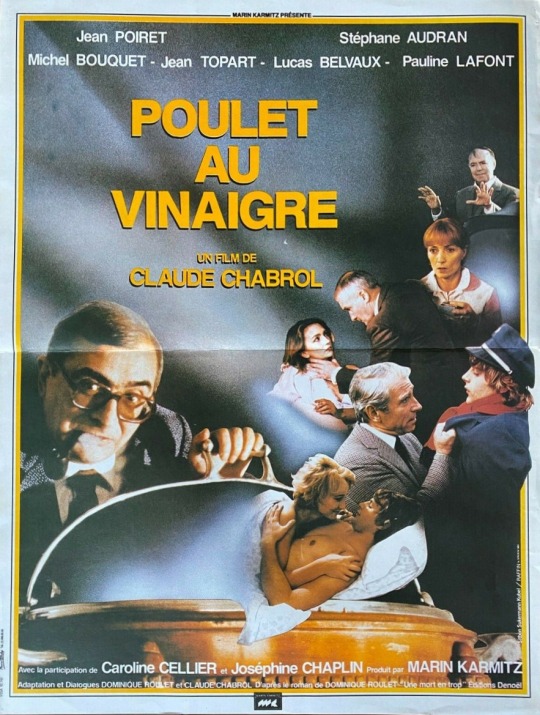
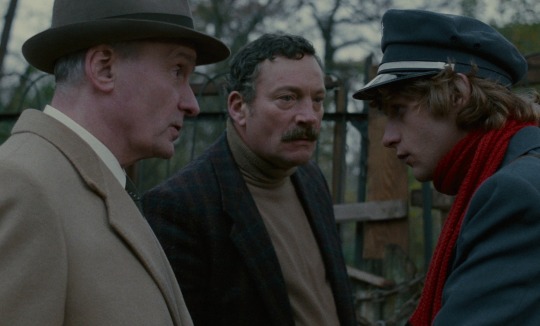
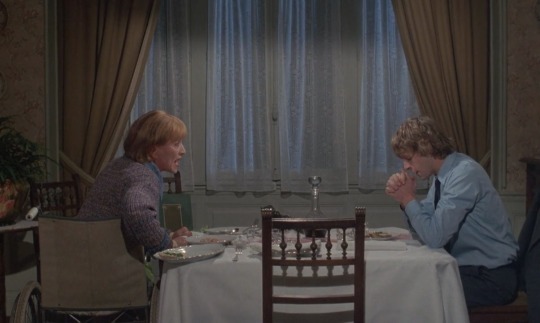
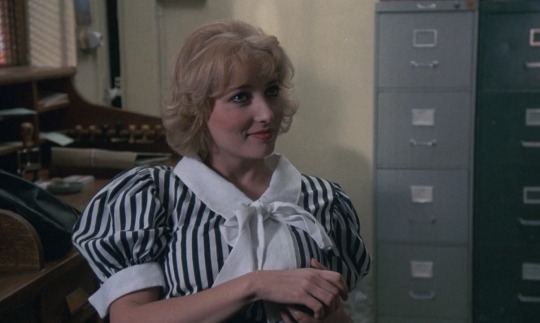



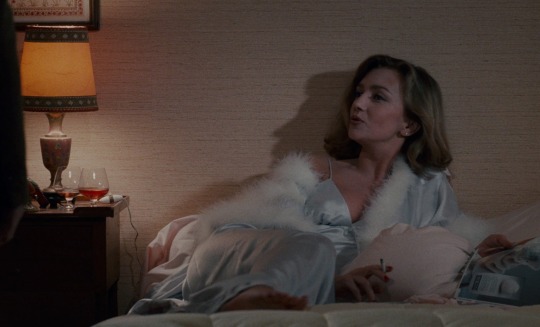


Poulet au vinaigre (Cop Au Vin, 1985)
"I'm paid a modest sum to nose around, spy and pester people. And to find the truth."
#poulet au vinaigre#cop au vin#french cinema#claude chabrol#dominique roulet#1985#jean poiret#stéphane audran#michel bouquet#jean topart#lucas belvaux#pauline lafont#andrée tainsy#jean claude bouillaud#jacques frantz#albert dray#henri attal#dominique zardi#caroline cellier#josephine chaplin#beautifully shot mystery thriller with an eye toward social satire; the influence of Simenon hangs heavy‚ altho Poiret's Insp. Lavardin is#nothing like the steadfast Maigret. quite a bold move‚ to make your detective quite so objectionable: Lavardin isn't particularly likeable#from his introduction (more than 40 minutes into the film) but once he starts beating his suspects and waterboarding others as an#interrogation technique‚ he becomes downright detestable. the actual mystery plot is relatively slight‚ and the various twists won't#surprise anyone half way familiar with the genre‚ but this is more about the creation of a beautifully rendered portrait of small town#intrigues and the diseased spread of secrets than it is a conventional genre picture. the cast are uniformly excellent‚ and as much as i#disliked the character i have to say Poiret in particular is never less than mesmerising; every carefully chosen movement and expression‚#each discomforting smile as he bends the law until it breaks‚ in the name of pursuing 'justice'. my first Chabrol but certainly not my last
1 note
·
View note
Text
BORSALINO (1970)






























Marseille, 1930. Roch Siffredi est un jeune voyou récemment libéré de prison. Il rend visite au patron d'un cabaret, dit « le Danseur », pour retrouver sa compagne, Lola , mais aussi parce qu'il est persuadé que le Danseur l'a donné et l'a fait envoyer en prison : il met le feu au cabaret. Il retrouve Lola sur les indications du Danseur, mais celle-ci s'est entichée d'un certain François Capella , truand lui aussi, pendant qu'il purgeait sa peine.
Après une rencontre orageuse, les deux hommes deviennent amis et s'associent. Après avoir éliminé la concurrence sur le marché du poisson pour le compte de notables peu scrupuleux, ils se rendent compte qu'ils peuvent en faire plus et décident de conquérir la ville ensemble. Dénués de scrupules et imaginatifs, ils s'attaquent à l'un des deux parrains de Marseille nommé Poli, propriétaire d'un restaurant et gérant de l'approvisionnement de Marseille en viande, le second étant Marello , le propriétaire d'un casino clandestin. À cause d'une fuite, l'opération de sabotage des entrepôts de viande appartenant à Poli est un échec et ils sont obligés de se retirer. Ils partent alors à la campagne pour se faire oublier, pour recruter de nouveaux membres dans leur bande, acheter de nouvelles armes et préparer leur vengeance. À leur retour, ils tuent Poli devant son restaurant à l'aide de pistolets-mitrailleurs Thompson, c'est ainsi qu'ils gagnent leur rang parmi les notables de Marseille.
Lorsque Me Rinaldi annonce sa candidature au poste de député, Roch Siffredi veut intervenir, car Me Rinaldi est l'avocat de Marello, désormais leur concurrent ; fait député, Rinaldi donnerait à leur rival une influence accrue. Capella conseille cependant à Siffredi de ne rien faire pour l'instant car ils seraient les premiers soupçonnés. Or, Me Rinaldi est blessé par deux balles alors qu'il joue au tennis. Capella croit alors que Siffredi a commis cet attentat sans le prévenir et lui demande des explications.
Peu de temps après, Rinaldi est assassiné à l'hôpital. Le meurtrier n'est autre que le Danseur, qui déteste Siffredi depuis l'incendie de sa boîte de nuit, et qui de plus espère provoquer des règlements de compte entre les deux empires criminels, pour tirer les marrons du feu ensuite. Malheureusement pour lui, la veuve de Rinaldi l'identifie et un membre de la bande de Capella se charge de l'assassiner.
Malgré cela, Marello fait tuer des proches de Capella et Siffredi. Réconciliés, les deux amis échafaudent alors un plan audacieux. Après s'être rendus au casino de Marello, Capella doit jouer une partie pendant que Siffredi tue discrètement Marello ; au même moment, leur propre bande viendra braquer le casino afin de semer la confusion et leur fournir un alibi, puisqu'ils seront encore présents à l'intérieur du casino et feront partie des « otages » du gang attaquant le casino. Ce plan réussit à merveille et leur permet de prendre le contrôle total de Marseille, face à une police impuissante qui sait parfaitement qu'ils ne sont pas innocents mais ne dispose d'aucune preuve pour les confondre.
Siffredi organise alors une réception pour fêter leur succès ; mais Capella lui annonce qu'il a décidé de quitter Marseille, car il pense qu'ils finiront inéluctablement par devenir rivaux et par ensuite s'entretuer.
Capella quitte la réception. Siffredi, resté seul, se plonge dans ses pensées. Il en est brutalement tiré lorsqu'une rafale de pistolet-mitrailleur retentit à l'extérieur ; c'est Capella qui a été pris pour cible. La dernière scène du film montre Capella s'effondrant sous les balles, puis expirant dans les bras de Siffredi.
#Borsalino#Jacques Deray#Claude Bolling#Jean-Paul Belmondo#Alain Delon#Catherine Rouvel#Françoise Christophe#Corinne Marchand#Nicole Calfan#Hélène Rémy#Mario David#Lionel Vitrant#André Bollet#Pierre Koulak#Arnoldo Foà#Daniel Ivernel#Christian de Tillière#Julien Guiomar#Michel Bouquet#Henri Attal#Mireille Darc#Raoul Guylad#Iska Khan#Marius Laurey#Jean Panisse
1 note
·
View note
Text

Fantomas vs. Scotland Yard (Fantômas contre Scotland Yard), West German lobby card. 1967
#Fantomas vs. Scotland Yard#Fantômas contre Scotland Yard#André Hunebelle#Jean Marais#Louis de Funès#Mylène Demongeot#Jacques Dynam#Henri Attal#Lobby Card#Lobby Cards
1 note
·
View note
Note
16 for the OC ask meme?
16. How has their childhood affected the way they view an aspect of their life (people, education, society, themselves, etc)?
OC ASKS!
Valerie was very happy to have very much caring family. Marie and Henri Attal represented the dying middle class - they had a decent living with money always on the table. As the first generation of migrants running from France torn with economic crises, they brought to Night City their French culture.
When Valerie happened to be their only child, she was surrounded by care, love and she got quite good upbringing judging by the city's standards. Her parents did their best to give her good level of education. However, when Valerie lost her parents at the age of 13 her maternal-line uncle didn't pay much of attention for Valerie's education but he taught her how to survive on the streets when she was doing some gigs for his pawnshop in Heywood.
So, to sum it up. Valerie grew up to be a decent and somewhat kind girl who always remembers her cultural roots. Remembering the happy marriage of her parents, Valerie dreams of meeting the same husband as her father was for her mother. In terms of education, while Valerie's program is frozen in her teenage years, she is quite literate for a Heywood streetkid and possess skills of critical thinking which sometimes can be more important.
1 note
·
View note
Photo
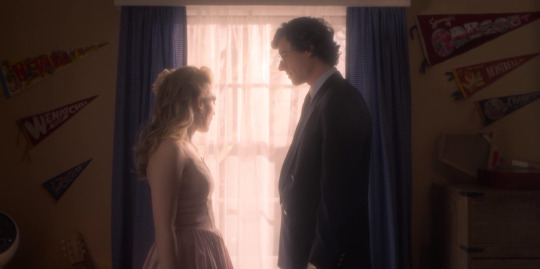

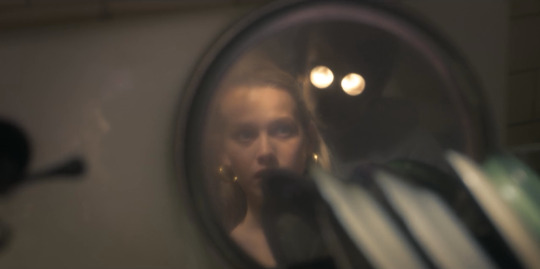




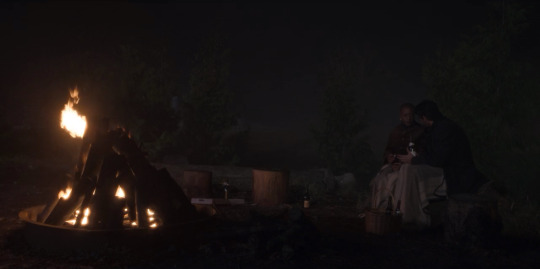

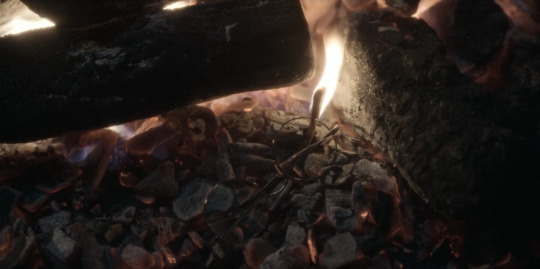
**Shots of the Episode**
The Haunting of Bly Manor (2020)
Episode 4: “The Way It Came” (2020)
Director: Liam Gavin
Cinematographer: Maxime Alexandre
#shots of the episode#the haunting of bly manor#haunting of bly manor#the way it came#liam gavin#maxime alexandre#victoria pedretti#roby attal#benjamin evan ainsworth#amelie bea smith#t'nia miller#rahul kohli#oliver jackson cohen#mike flanagan#henry james#netflix#screenshots#stills#screencaps#tv#tv stills#tv screencaps#streaming#2020 tv#2020s tv#2020 in tv#2020#ghosts#2.00:1
41 notes
·
View notes
Photo




Sir Edmund Orme (1891) written by Henry James
The Haunting of Bly Manor (2020) created by Mike Flanagan
#Sir Edmund Orme#Henry James#Victora Pedretti#Dani Clayton#Robby Attal#Edmund O'Mara#The Haunting of Bly Manor#Bly Manor#Mike Flanagan#parallels are like crack to me
22 notes
·
View notes